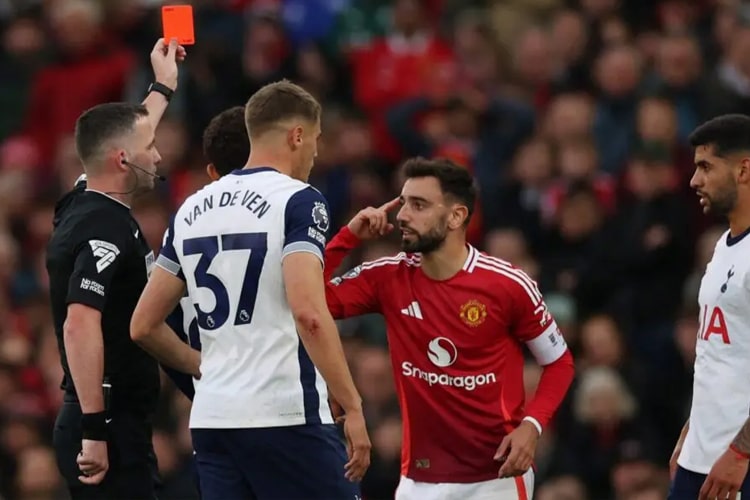Webb points to Fernandes' studs: 'Red card rightly dismissed'

Howard Webb believes it was correct that Bruno Fernandes' red card against Tottenham Hotspur was dismissed. The English refereeing chief shared this in the Premier League program "Match Officials Mic'd Up."
In the Match Officials Mic’d Up program, hosted by former England striker Michael Owen, controversial decisions made by referees in recent Premier League games are discussed and reviewed.
One of the key talking points in a recent episode was the red card shown to Manchester United midfielder Bruno Fernandes during a match against Tottenham Hotspur. The decision sparked significant debate in England, with many questioning whether the tackle deserved such a harsh punishment. Even Fernandes himself was adamant that it was "never a red card."
Following the match, Fernandes appealed the suspension that came with the red card, and ultimately, the card was rescinded after a review by the Football Association. The reversal led to further discussion, especially as many fans and pundits questioned why the initial decision was made and why the Video Assistant Referee (VAR) didn’t intervene more actively at the time.
Former Premier League referee and current head of refereeing, Howard Webb, weighed in on the issue during the program. Webb supported the final decision to dismiss Fernandes' red card. He explained how the situation unfolded: "The assistant referee indicated it was a red card, and the referee followed his advice. But when you look back at the footage, it becomes clear that Fernandes didn’t make contact with James Maddison with his studs. Had he made such contact, it would certainly have been a red card."
Webb explained that when VAR reviewed the incident, they decided not to overturn the referee’s call at the time because the decision was not deemed to be entirely incorrect. "VAR saw that Fernandes made contact with Maddison high on his leg and that there was no clear intent to play the ball, which led to them allowing the decision to stand," Webb said, justifying why VAR did not initially intervene.
However, Webb then expressed his disagreement with the way the situation was handled. "But I don’t think that’s correct," he continued. "The contact was made with the side of Fernandes’ foot, and there was absolutely no indication that he was going to strike Maddison with his studs. Essentially, Fernandes tripped Maddison more than anything, and there was no real risk of causing a serious injury."
Webb argued that, given the clearer context provided by the footage, the VAR should have taken a more active role in the decision-making process. "If you can see this so clearly, in my opinion, the VAR has to intervene. The referee should have been sent to the monitor to review the incident himself."
As a former referee who officiated at the highest level, including the 2010 World Cup final, Webb is no stranger to high-profile controversies. During that final, he himself faced significant criticism for not sending off Dutch midfielder Nigel de Jong after a reckless challenge on Spain’s Xabi Alonso, where de Jong struck Alonso in the chest with a high foot. That incident has remained a talking point in the world of refereeing, with many seeing parallels in how challenging decisions can unfold in the heat of the moment.
Webb's commentary highlights the complex nature of modern refereeing, especially with the introduction of VAR. While the technology is meant to aid referees, it has also led to discussions about its proper use and when interventions are necessary. In the case of Fernandes' red card, Webb's view is that VAR should have intervened to provide clarity, but he also understands the pressure referees face in making split-second decisions during fast-paced matches.
The discussion about Fernandes' red card and its subsequent dismissal underscores the ongoing debates within the football world about officiating standards, the role of VAR, and the balance between protecting players and allowing the game to flow. For Fernandes and Manchester United, the reversal of the card came as a relief, but for referees and football authorities, it was yet another reminder of how contentious decisions can become in the age of video technology.